The Independent's journalism is supported by our readers. When you purchase through links on our site, we may earn commission.
What’s happening in Myanmar?
Now on the verge of civil war, Russell Goldman takes a deep dive into the unrest in the country since February’s military coup d’etat
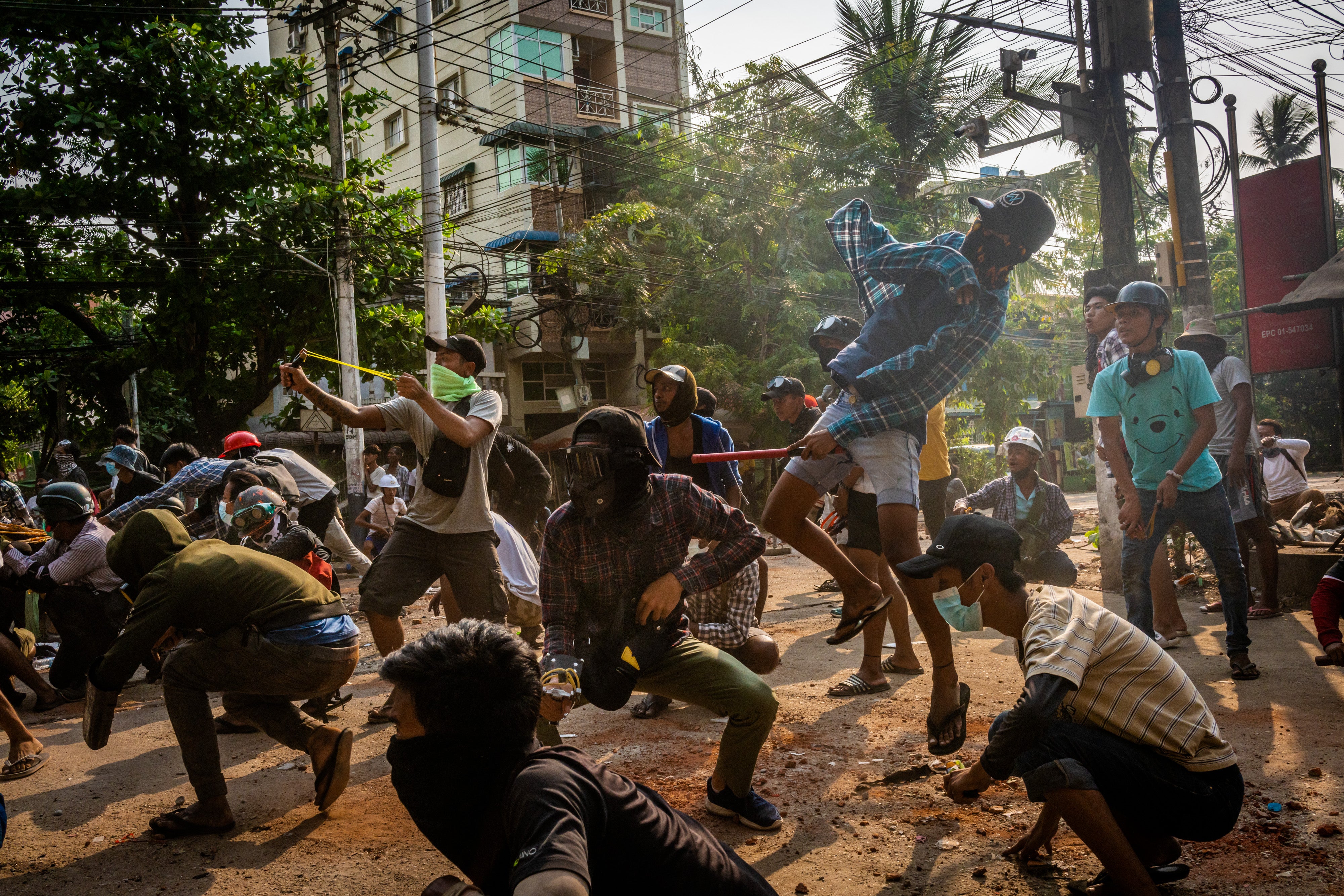
Your support helps us to tell the story
From reproductive rights to climate change to Big Tech, The Independent is on the ground when the story is developing. Whether it's investigating the financials of Elon Musk's pro-Trump PAC or producing our latest documentary, 'The A Word', which shines a light on the American women fighting for reproductive rights, we know how important it is to parse out the facts from the messaging.
At such a critical moment in US history, we need reporters on the ground. Your donation allows us to keep sending journalists to speak to both sides of the story.
The Independent is trusted by Americans across the entire political spectrum. And unlike many other quality news outlets, we choose not to lock Americans out of our reporting and analysis with paywalls. We believe quality journalism should be available to everyone, paid for by those who can afford it.
Your support makes all the difference.Unrest has gripped Myanmar. Peaceful pro-democracy street demonstrations and work stoppages have given way to paramilitary operations in opposition to the country’s ruthless military, which seized power in a coup d’etat on 1 February.
Military leaders’ initially restrained response to the first waves of protests, civil disobedience and general strikes grew more forceful over time, escalating into a brutal effort to put down the movement. The Tatmadaw, as the Myanmar military is known, is now trying to eliminate resistance along the border, firing rocket launchers and burning down homes.
The coup returned the country to full military rule after a short span of quasi-democracy that began in 2011, when the military, which had been in power since 1962, carried out parliamentary elections and other reforms. In the months since the coup, Aung San Suu Kyi, the country’s ousted civilian leader, has faced charges in a secret court.
What led to the military coup in Myanmar?
In early 2021, the country’s parliament had been expected to endorse recent election results and approve the next government. The National League for Democracy, Myanmar’s leading civilian party, had won 83 per cent of the body’s available seats.
The military refused to accept the results of the vote, which was widely seen as a referendum on the popularity of Suu Kyi. As head of the National League for Democracy, she had been the de facto civilian leader since her election in 2015.
The possibility of the coup emerged after the military, which had tried in the country’s Supreme Court to argue that the election results were fraudulent, threatened to “take action” and surrounded the houses of parliament with soldiers.
Soldiers have fired rocket launchers, burned down homes, cut off food supplies, and shot at fleeing civilians, according to residents
How was the coup carried out?
The military detained the leaders of the National League for Democracy and other civilian officials, including Suu Kyi and president U Win Myint, cabinet ministers, the chief ministers of several regions, opposition politicians, writers and activists.
The coup was effectively announced on the military-owned Myawaddy TV station when a news presenter cited the 2008 constitution, which allows the military to declare a national emergency.
The military quickly seized control of the country’s infrastructure, suspending most television broadcasts and canceling domestic and international flights.
Telephone and internet access was suspended in major cities. The stock market and commercial banks were closed, and long lines were seen outside ATMs in some places. In Yangon, the country’s largest city and former capital, residents ran to markets to stock up on food and other supplies.
How have people been protesting?
Weeks of relatively peaceful protests quickly turned deadly on 20 February when two unarmed protesters were killed by security forces in Mandalay, one of whom was a 16-year-old boy.
On 22 February, millions of people across the country took to the streets in a general strike. Since then, an expanded civil disobedience movement has paralysed the banking system and made it difficult for the military to get much done.
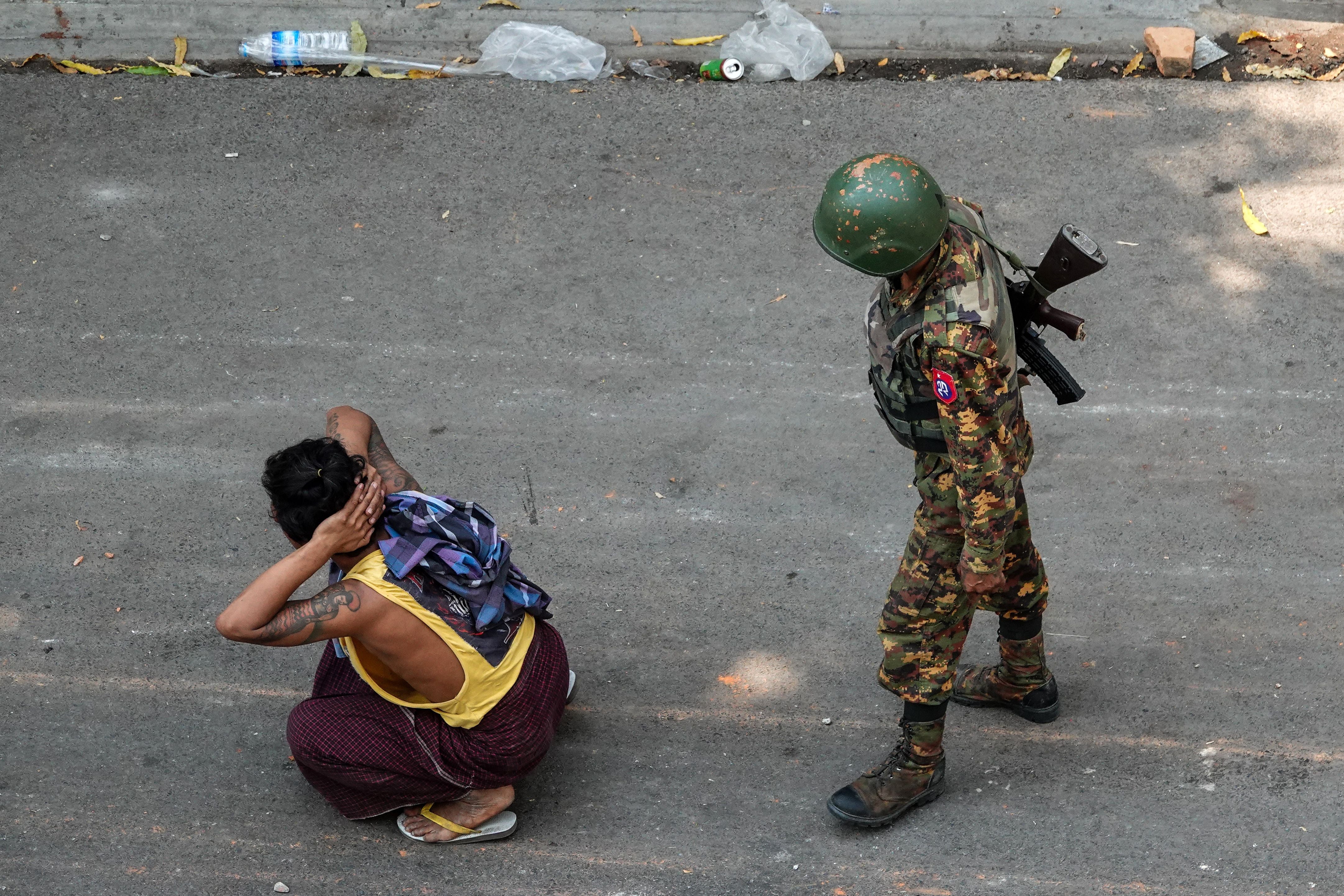
As the demonstrations entered their second month, the military, notorious for having crushed democracy movements in 1988 and 2007 by shooting peaceful protesters, became more violent in its response. Since the coup, nearly 1,300 people have been killed by the junta and more than 10,000 have been arrested, according to a monitoring group.
Among the protesters, there is a growing recognition that the Tatmadaw needs to be countered on its own terms. In the country’s jungles, people are training with firearms and hand grenades.
The country is now on the verge of a civil war, according to the departing UN special envoy on Myanmar.
How is the military continuing to quash resistance?
Since the bloody crackdown against protesters in major cities, the military has been moving aggressively to eliminate resistance along the country’s border. The Tatmadaw is targeting areas that are home to armed civilians known as the People’s Defence Force.
Residents have reported a large buildup of troops in northwest Myanmar. Soldiers have fired rocket launchers, burned down homes, cut off food supplies, and shot at fleeing civilians, according to residents.
Desperate to escape the violence, families are fleeing into neighbouring India. An entire town of roughly 12,000 people has nearly emptied out. Aid groups, concerned about a humanitarian crisis, are preparing for a flood of refugees.
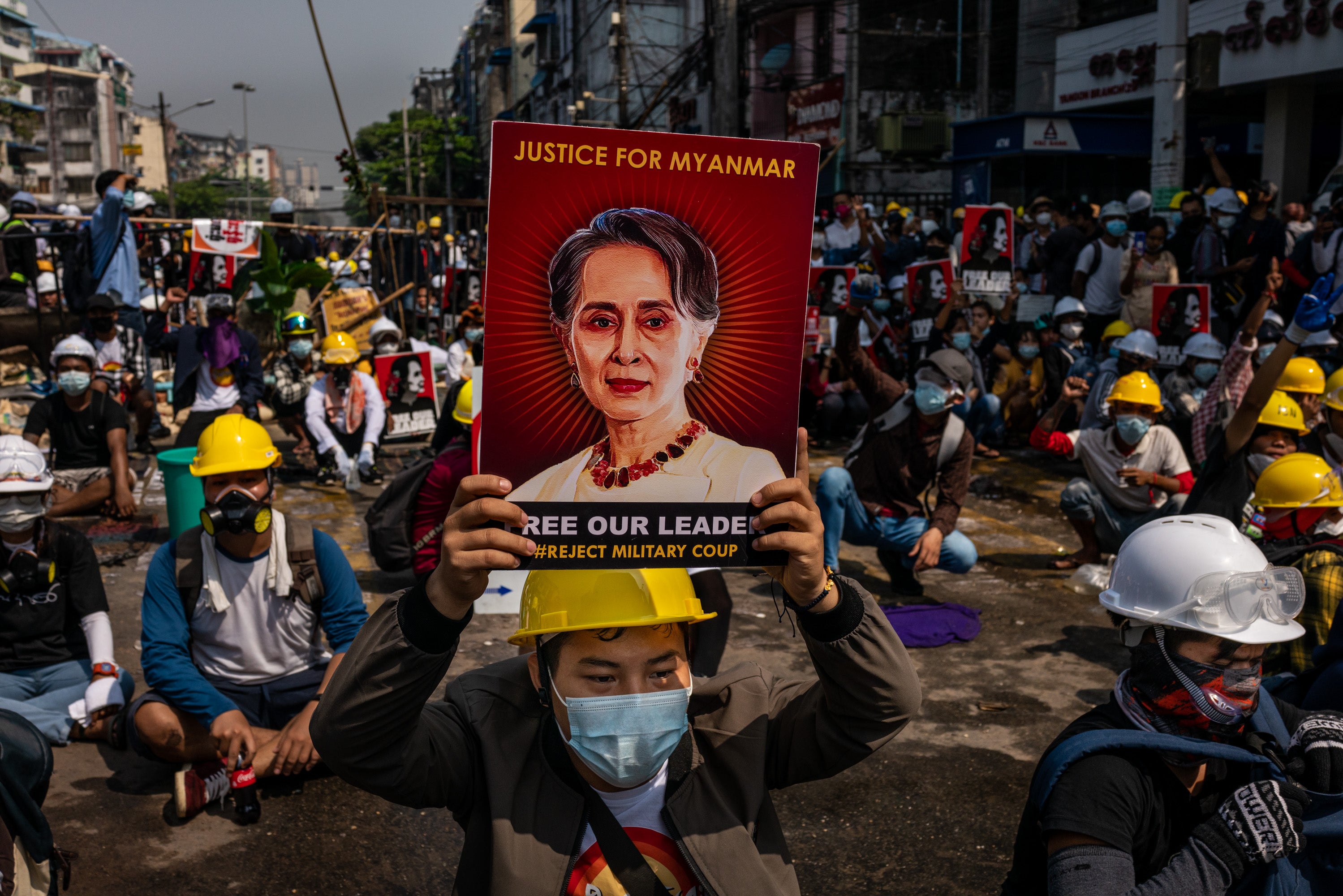
Who is Suu Kyi?
Suu Kyi came to power as state councillor in 2016 after the country’s first fully democratic vote in decades.
Her ascension to leadership was seen as a critical moment in the transition of Myanmar, formerly known as Burma, to democracy from military dictatorship. Suu Kyi, the daughter of the country’s independence hero General Aung San, spent more than 15 years under house arrest.
Her time in detention made her an international icon, and she was awarded the Nobel Peace Prize in 1991.
After she was released from house arrest in 2010, her reputation was tarnished by her cooperation with the military and her vociferous defence of the country’s deadly campaign against the Rohingya, a Muslim ethnic minority group. In 2019, she represented Myanmar at a trial in the International Court of Justice, at which she defended it against accusations of ethnic cleansing.
Many believed Suu Kyi’s cooperation with the military was a pragmatic move that would hasten the evolution to full democracy, but her detention since the coup appeared to prove the lie in the military’s commitment to democracy.
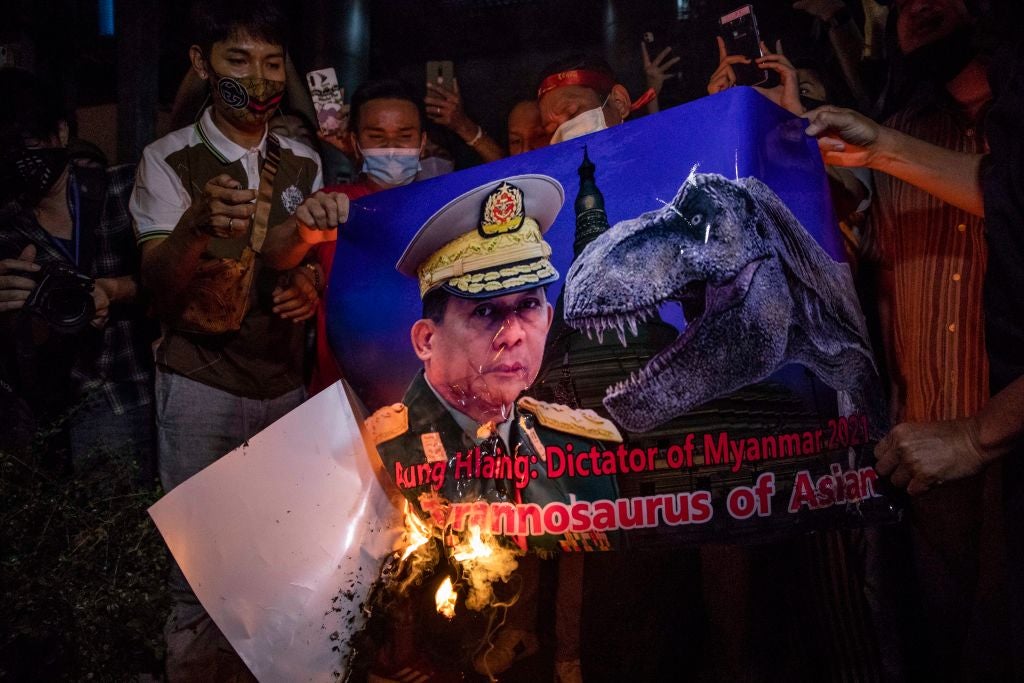
Why is Suu Kyi on trial?
A secret trial for Suu Kyi began on 16 February 2022.
Suu Kyi has been accused of violating import restrictions after walkie-talkies and other foreign equipment were found in her villa compound. She has also been charged with contravening a natural disaster management law by interacting with a crowd during the coronavirus pandemic.
If convicted of all 11 charges against her, she could be sentenced to a maximum of 102 years in prison.
The UN and foreign governments have described the case as politically motivated. The junta has barred all five of her lawyers from speaking to the media, saying their communications could “destabilise the country”.
Who is Senior General Min Aung Hlaing?
After the coup, the military handed power to the army chief, Senior General Min Aung Hlaing.
The move prolongs the general’s power even though he is supposed to age out as army chief this summer. His patronage network, centred on lucrative family businesses, could well have been undermined by his retirement, especially had he not been able to secure a clean exit.
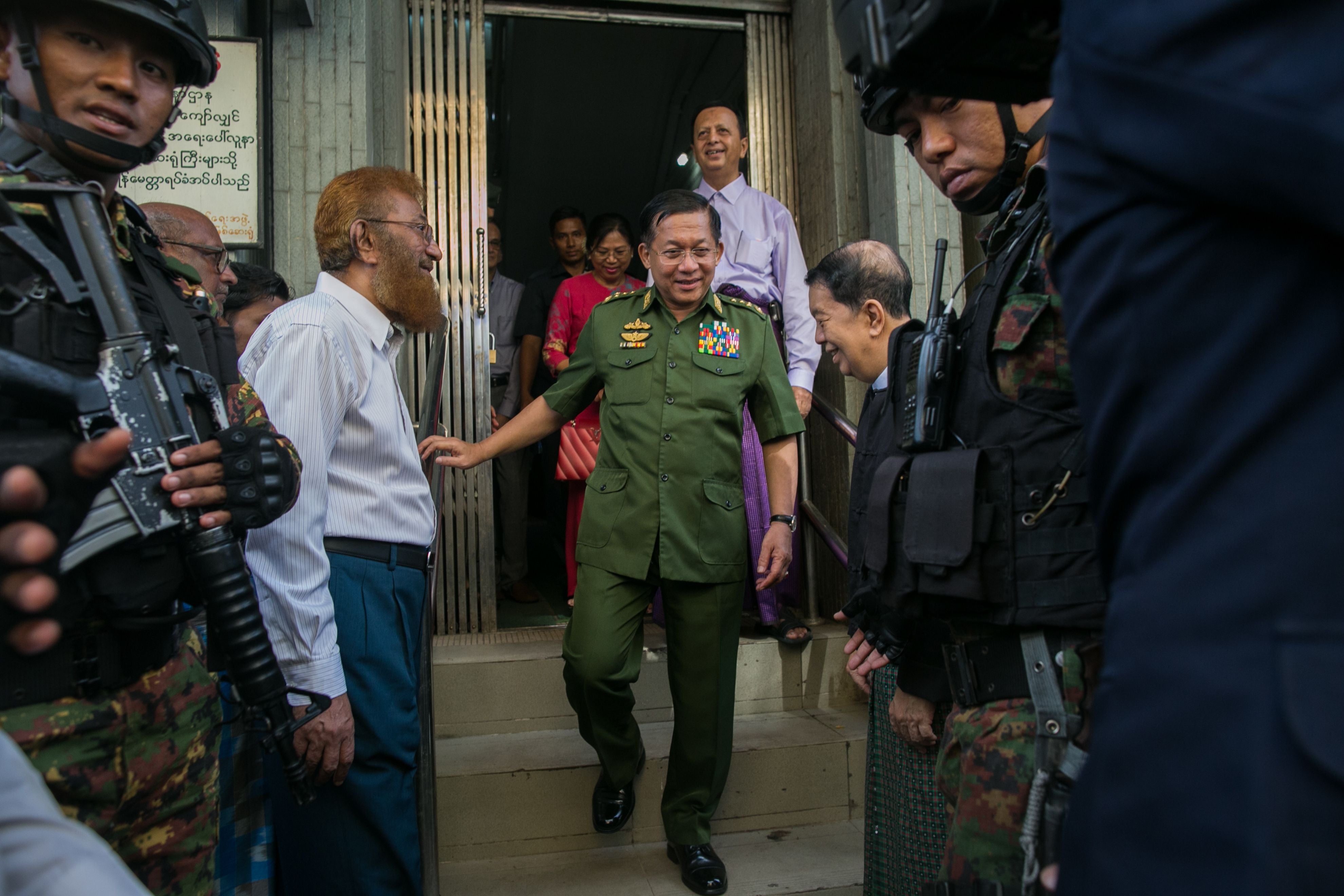
Under the former powersharing agreement, Min Aung Hlaing presided over two business conglomerates and was able to appoint three key Cabinet members who oversee the police and border guards.
The military never fell under the civilian government’s control. In recent years, the army, with Min Aung Hlaing at the helm, has overseen campaigns against several of the country’s ethnic minority groups, including the Rohingya, the Shan and the Kokang.
What has been the international reaction?
Several major world leaders quickly condemned the coup, demanding that Myanmar’s military immediately free Suu Kyi and the other detained government officials and honour the November election results. But it was not immediately clear what sort of concrete actions, if any, other nations might take.
The Biden administration, which has sought to elevate human rights as a foreign policy priority, announced sanctions in late March in coordination with the EU that named military officials and other entities in Myanmar for their violence against democracy advocates.
UN secretary-general Antonio Guterres said the coup developments “represent a serious blow to democratic reforms in Myanmar”. And Boris Johnson said on Twitter that the “vote of the people must be respected and civilian leaders released”.
This article originally appeared in The New York Times.

Join our commenting forum
Join thought-provoking conversations, follow other Independent readers and see their replies
Comments